Trash talk among 'friends'
Updated: 2015-09-28 07:46
By Raymond Zhou(China Daily)
|
||||||||
The line between public and private blurs in cyberspace. Unless it is a one-to-one conversation, people should not assume what's said will remain confidential. Impropriety in virtual space will be taken likewise in the real world.
Does a student have the right to disparage a predecessor? Is there any etiquette regarding such matters? What if there is an online-offline toggle?
There seems to be a consensus that differences of opinion be respected, especially in academia where unconventional views sometimes lead to breakthroughs in research. As Sun Jiazhou says, "Everyone has the right to freedom of expression on WeChat and everyone else has the right to judge that."
Sun is the dean of the history institute at Renmin University of China. On Sept 20, he publicly announced that Hao Xianghe was no longer his student, thus ending their mentor-protege relationship.
The previous day, Hao had posted a comment to his WeChat circle, which included the following sentence: "I used to laugh at Professor Tian's coterie, Yan Buke and Han SF among others, who are either mediocre or traitors to their own race."
Tian, Yan and Han are all renowned scholars in the area of an ancient China dynasty. They are Sun's peers.
Sun says it was not the first time Hao had maligned others. He had reminded Hao to "be peaceful" and refrain from frequent attacks on others.
"I have been agonized by your posts. I do not ask you to agree with me, but I'll have to let you know of my anxiety," Sun wrote to Hao earlier.
Most people have sided with the professor since the seemingly trivial incident broke out, saying that they did not see Hao's statement as academic dissent. It was inappropriate for a student, or anyone for that matter, to talk in such sweeping and belittling terms about others, let alone figures of authority in your own field.
However, it is not unique to hear newcomers in a field of expertise who hold opinions such as Hao's. Usually, the less knowledge a person has, the more disdain he will have for symbols of authority.
There was a campus joke during my graduate years in Guangzhou's Sun Yat-sen University: When you ramble from room to room in the male dormitory building, you'd get the feeling that, out of every 10 students, eight have the self-assurance they already possess the capability to be the premier of China.
It is commonplace that after you've read three books on a certain discipline you feel so empowered that you talk as if you're the absolute authority and can look down on everyone else. But after you read 300 books, you'll realize how little you know about the subject.
Hao is a first-year postgraduate student in a master's program. Rebellious youngsters like him are a dime a dozen.
I'm not denying that, out of the hundreds and thousands who challenge authorities, a few would supersede the previous generation and become masters of their own. They would have to do it by establishing their newer or subversive theories supported with strong research, not by making general statements.
It is not wrong to rebel, but it would be a sign of ignorance to rebel without originality of thought.
Now the tricky part: What is the right platform to air such pet peeves as Hao's?
When a student proclaims in his dorm room a certain scholar is "just garbage", few would say he is out of line. But if he does the same in a classroom, it would be taken very differently. To take it one level up, it would be like throwing down the gauntlet if the same sentiment is published in a school newspaper.
So, it is the platform that largely determines whether such grumbling is tantamount to bad manners.
Hao insists that a WeChat account is a private arena. He explains that Sun is the only member of academia among his WeChat "friends", and the rest are family and friends. "It is very different from Professor Sun's WeChat friends, who must include many peers," he said.
The difference between Weibo and WeChat, says a German who lives in China and maintains an active online profile, is that the former is like a public square and the latter a person's living room. Anyone can drop in and listen to what you have to say on your Weibo account, but only those who have friended you and been friended by you can sit in on your WeChat monologue.
But WeChat is still evolving while Weibo has pretty much matured, or as some would say, is going downhill. If you have only 10 friends on WeChat, yes, it is indeed a virtual living room. What if you have 1,000?
That is the number I have accumulated out of reluctance and I weed out many offers. I simply do not know the rules. When someone applies to friend me and gives his real name and identity, I always accept, taking it as a sign of sincerity.
If someone gives only the online handle and without a word of explanation, I usually ignore the request. I must have offended some that way, but I'm terrible with remembering names, especially online handles.
My logic is, if you want others to remember you, why wear a cloak of anonymity and mystery. Moreover, I suspect many of these requests are generated by software for the purpose of launching promotions.
My gray area is a request with an explanatory note that mentions my name but does not mention who he or she really is. I usually oblige, out of fear that I may slight someone. So, of the 1,000 WeChat friends I have, I know at most 300.
The result, I do not put up mutterings there the way I would on a dinner table of acquaintances - except when I want to plug a friend's book or my new play.
And I rarely follow others' posts unless I'm going through a night of insomnia. Anyway, I'm not comfortable reading others' diaries. I've found WeChat less informative than Weibo and it is an echo chamber with the destructive power of winnowing out diversity of opinions.
So, did the student step over the line of good manners? I believe he did. If his professor is in his living room, the student deriding and discrediting the elder's peers would make him squirm. The professor's reticence might be mistaken for his acquiescence to the student's opinion - if the posts are made public. And trust me, people repost their friends' WeChat mumblings all the time.
Call it "the selfie of internal monologue".
Contact the writer at raymondzhou@chinadaily.com.cn
(China Daily 09/28/2015 page20)
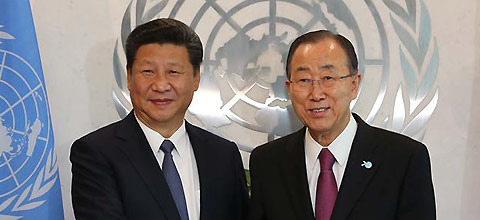
 Xi pledges $2 billion to help developing countries
Xi pledges $2 billion to help developing countries-
 Xi calls for equitable, open, all-round development
Xi calls for equitable, open, all-round development 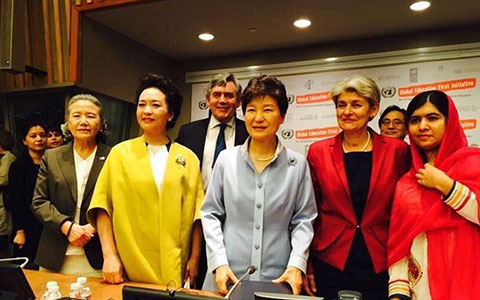
 First Lady Peng delivers speech in English at UN
First Lady Peng delivers speech in English at UN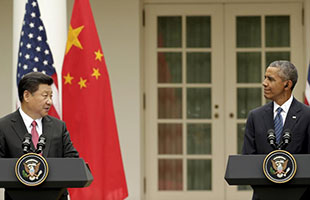
 Three Xi-Obama meetings: From casual to black tie
Three Xi-Obama meetings: From casual to black tie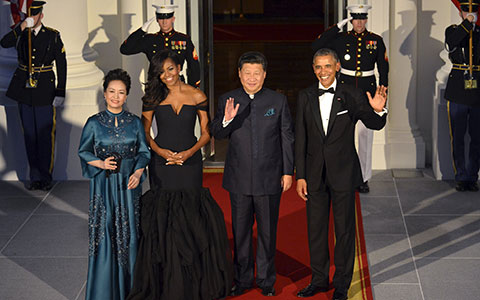
 White House hosts state dinner for President Xi
White House hosts state dinner for President Xi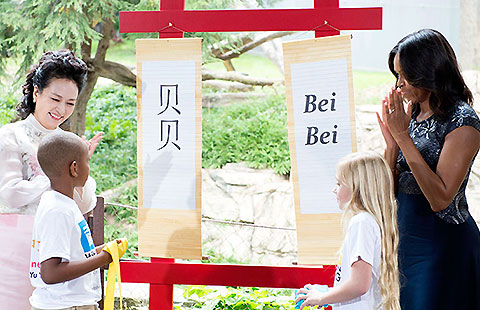
 First ladies name giant panda cub 'Bei Bei' in Washington
First ladies name giant panda cub 'Bei Bei' in Washington
 Xi, Obama take aim at cybertheft
Xi, Obama take aim at cybertheft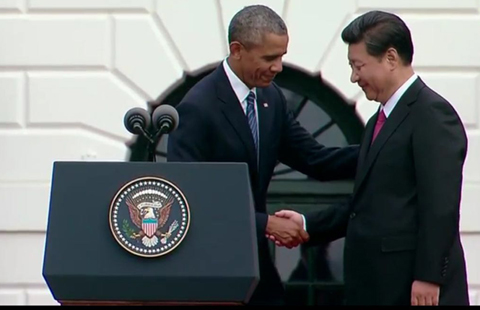
 Obama welcomes President Xi for state visit with 'Nihao'
Obama welcomes President Xi for state visit with 'Nihao'
Most Viewed
Editor's Picks

|

|

|

|

|

|
Today's Top News
Xi pledges $2 billion to help developing countries
Young people from US look forward to Xi's state visit: Survey
US to accept more refugees than planned
Li calls on State-owned firms to tap more global markets
Apple's iOS App Store suffers first major attack
Japan enacts new security laws to overturn postwar pacifism
Court catalogs schools' violent crimes
'Beauty of Beijing's alleys akin to a wise, old person'
US Weekly

|

|








